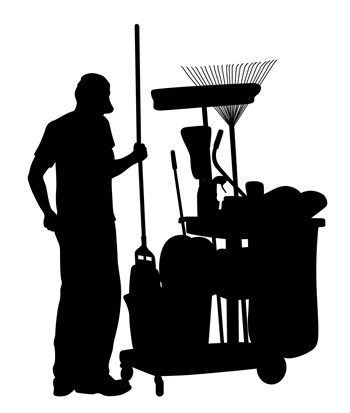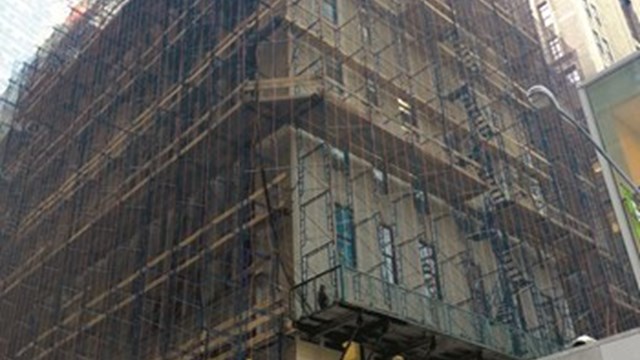
Whether we rent, own a single family home, or have purchased a condominium, the nagging question is always, “Who’s going to take care of this mess, problem or situation?” For condominium unit owners, the answer to that question varies.
Sometimes it may be the superintendent who “oversees all maintenance-related activities on the site, troubleshoots all property systems, and performs or oversees repairs,” according to Kim Brauer, vice president of TDG SignatureTM, the urban luxury division of The Dartmouth Group in Boston and Bedford, Massachusetts. At other times, it may be the custodian or janitorial staff whom Laura Waldrop, vice president of Barkan Management in Boston, says is responsible for items such as “cleaning, vacuuming, and generally ensuring that the building is clean and tidy.”
Occasionally the services of a building engineer are required. This is usually someone with specific expertise such as a plumber or electrician, who is hired to come in when there is a specific problem which only a licensed technician can fix.
24 Hours a Day
Which of these people, when, and how many are on-site at a condominium property may differ from site to site. Whitney Moran, director of human resources at First Realty Management Corp. out of Boston says, “We will staff a building how the owners or association governing board desires; however, one commonality among all of our managed properties is that someone is always on call 24 hours a day, seven days per week.”
David Abel, senior property manager at First Realty, adds that “most condominium communities of 100 units or greater have a full-time maintenance person.”
It’s also important to remember, says Brauer, “that the needs of a high-rise building are quite different from townhouses. Many high rises have complex mechanical systems, and the staff needs to be familiar with them, knowing how to troubleshoot problems and maintain those systems. Also, for high rises, custodial staff could be cleaning 20 stories of common area halls and stairways a day while in a townhouse community their focus may be primarily on the exterior grounds.”
Just as the needs for staffing and the hours between superintendents, custodians and engineers vary, so does the level of experience and education needed to be a condominium superintendent. Waldrop explains that while a superintendent may need to be available 24/7 that “custodial staff usually comes in according to a scheduled timetable, and engineers are called as needed.”
Waldrop says that “most associations require a couple of years of experience, but more complicated properties may need someone with specific experience in staff supervision or know-how with regard to getting bids and proposals for campaign projects.”
Moran adds that “the common career path for someone to become a maintenance supervisor or superintendent is to have a minimum of five years’ residential maintenance experience. Additionally, the superintendent must be a high school graduate and have basic knowledge of electrical and plumbing concepts, heating ventilation and air conditioning systems, carpentry, and other general repair and maintenance duties.”
Brauer concurs and explains that for superintendents who need “to tend to complex HVAC systems, additional specialized education is preferred, and if they need to operate pools, they must be a CPO or Certified Pool Operator for Massachusetts.”
No matter how well-trained or experienced, however, Michelle Mitchell with the New England Affordable Housing Management Association (NEAHMA) in Braintree, Massachusetts, says that emergency, urgent situations sometimes dictate learning more. “This past January/February, we had to add specific training courses in ice dams and mold because of the type of winter we had. In fact, superintendents and maintenance people are always in need of changing courses. For example, if we were to have an earthquake, we would bring in professionals to train people on how to deal with the issues the earthquake may have caused for buildings and residents.”
Varying Roles
The specific jobs superintendents may or may not do also differ. According to Waldrop, sometimes there is a crossover of duties. For example, “if there is a spill and no custodian is available, the superintendent may have to take care of it, though technically his job may be to supervise. In the end, he’s hired to make sure things get addressed, so his job description may have to also include light janitorial jobs as needed.” Duties also vary according to the needs of the condominium complex. Moran says that “it is common for maintenance technicians to achieve the Certified Pool Operator certification at properties where a swimming pool is a common amenity, but First Realty does not require maintenance personnel to have their electrical or plumbing licenses. Often, homeowner associations will have long relationships with licensed electricians and plumbers, and part of our duties as the property management firm is to work with those vendors.”
“The on-site maintenance team focuses on common area repairs and maintenance,” Brauer explains. “Sometimes, however, there are emergency situations which need to be tended to by someone with specific skills and licenses, for example a plumber to replace a hot water heater.”
According to Mitchell, superintendents will often take NEAHMA electrical, plumbing, and other hands-on courses because “then they have these skills and there isn’t a need to hire out when a problem arises. This adds to the experience the superintendents or maintenance personnel have to offer, which can affect their salaries.”
Who pays the salaries is usually the condominium association or the property management company. Brauer says that to her knowledge, “the positions are rarely unionized,” and Moran notes that “employees’ wages and benefits are competitive within the industry where the size of a property being maintained and the years of experience are factors in individual compensation.” According to Waldrop, superintendents usually “receive benefits like health and dental insurance, access to a 401K plan, disability protection, and vacation days,” though the exact options offered will vary according to property management groups or homeowners associations.
The Service Employees International Union (SEIU) local for building service workers in New England (District 615) consists of 18,000 property services workers in Massachusetts, Rhode Island and New Hampshire, including janitors, security officers, maintenance and custodial workers, and window cleaners. But their duties are primarily to clean, maintain and provide security for buildings in the region’s leading industries including commercial office real estate, financial services, higher education, health care, biotech, high tech, and transportation and tourism, not residential properties.
Chain of Command
Whether the superintendent works directly for the association or is hired by the property manager, there is a chain of command that one follows for work to be done. Brauer explains that for The Dartmouth Group condominium properties, “the superintendent reports directly to the manager, and the manager takes direction from the board. Any unit owner can request work to be done through a web-based management tool called MyDartmouthGroup.com that allows residents to submit requests directly to management online. It then will be up to management to determine who is responsible for the work.”
According to Abel, “With First Realty, requests for service from residents go through the concierge, property manager if one is on-site, or through the property management firm’s customer service staff if there is one. Anyone can request work or note a problem, and the manager determines and manages the maintenance superintendent’s time, at least in the macro sense. At some properties, there also exists an online building management software program that allows residents to notify staff when they have a maintenance service request.”
At Barkan Management, Waldrop explains that “residents contact the property manager to submit a work order, and the property manager then sends a work order to the superintendent who will dispatch the appropriate person for the job, whether it’s a member of the janitorial and maintenance staff or a needed licensed engineer or outside vendor.”
As is usual in life, though, bumps may appear in any set course. “It’s common for unit owners and residents to try to bypass the process and get the staff to handle requests directly,” laments Brauer. “The staff is trained to instruct the residents to use the website and/or contact management directly with any maintenance requests. The maintenance staff will then tend to the requests as they come in, provided the work falls within the scope of work approved.”
Waldrop adds that also “as in life, where there are many people working together personality conflicts are bound to happen.” She explains that it could be as simple as a resident complaining that a superintendent was rude in response to a particular request for work to be done. Sometimes the conflict is more serious, though, and requires interventions from the property managers.
Abel, though, says that First Realty works in a team environment that entails concierge, maintenance, manager, and customer staff cooperating in the effort, which can help to minimize some of those relational bumps. These relational issues, however, between superintendents and residents are why Mitchell says NEAHMA offers what they refer to as “soft courses,” which are courses in skills like “how to deal with difficult people,” “understanding residents with Alzheimer’s,” and “relational workshops.”
For anyone interested in becoming a maintenance supervisor or maintenance technician, Mitchell says that NEAHMA offers courses toward certification in both, providing courses in everything from learning the rules and regulations which guide fair housing to plumbing and electrical skills to dealing with lead paint to qualifying people to recycle and have a “green” designation.
Moran adds that in the New England region, there is the Community Associations Institute New England (CAI-NE) chapter (www.caine.org) and the Institute of Real Estate Management (IREM). Both are national professional organizations that serve the industry. IREM (www.iremboston.org) has a chapter based in the Boston area, she says. In addition to the New England chapter, CAI also has a Connecticut chapter (www.caict.org) based in Glastonbury.
As for IREM, Beth Smukowski, a continuing education administrator there, explains that if you go online to IREM’s website, you can find online and classroom courses, webinars, and a learning toolbox for maintaining needed skills. CAI also provides online webinars and live classroom training for professional managers.
So, when the question arises as to “Who is going to take care of this mess, problem or situation?” look no further than a trained building services professional. For condominium owners, the answer is that it will definitely be taken care of and they can be sure that it will be fixed by people who have the experience, qualifications, and training necessary for the job to be done well.
Paula Castner is a freelance writer and a frequent contributor to New England Condominium.






Leave a Comment